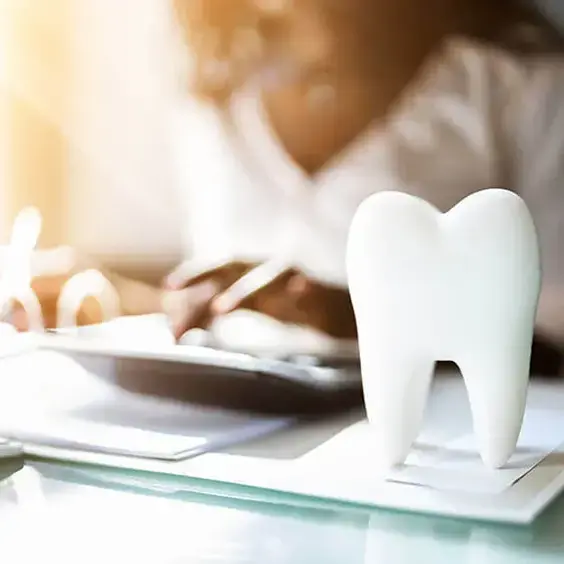Stopping Tooth Pain With Root Canals in Connecticut
Root canal treatment is a highly effective procedure with a good prognosis for success.
Service offered at the following location(s): Groton Dental and Windham Dental

Why Root Canals?
Getting root canal treatment rather than an extraction has many advantages. It can reduce and eliminate pain to eat and drink properly. It also reduces the risks of further tooth damage, leading to more complex and expensive treatments, like dental implants, to replace missing teeth.
After a root canal process, if you maintain proper oral hygiene, your root canal can last for many years.
Other advantages of getting a root canal:
- Improves chewing
- Protects other teeth from being removed and maintains the integrity of your teeth
What to Expect
A root canal treatment is done to save a tooth that is infected and causing pain and would otherwise need to be extracted. An extraction is more costly and may cause complications with adjacent teeth.
BeforeTreatment
A root canal may be needed when you face problems, including decay that has reached the living tissue inside the tooth (tooth pulp), infection, dental abscess inside the tooth or the root tip, or injury to the tooth.
Symptoms that can indicate you may need a root canal procedure include:
- A dental abscess (or pimple) on the gums
- Sensitivity to hot and cold
- Severe toothache pain
- Swelling or tenderness
Before your root canal, let your dentist know about any symptoms you are experiencing.
DuringTreatment
A root canal procedure typically requires one to three appointments and is performed by a dentist or an endodontist (a root canal specialist).
- Before the dentist begins the procedure, an x-ray of the tooth will be taken.
- The dentist will numb the tooth with a local anesthetic. Once your tooth is numb, the dentist will use a series of root canal files to access the infected area.
- The dentist will remove the dental pulp, nerve tissue, and any bacteria from the infected tooth. If there is tooth decay present, this is also removed. Once the tooth is cleaned thoroughly, the tooth is sealed with a permanent root canal filling.
- At the next appointment, the roots and inside the cavity of the tooth are filled and sealed. A root canal filling is placed to cover the opening of the tooth.
AfterTreatment
After a root canal, the tooth should have a dental crown (cap) set to help protect the tooth and prevent it from cracking or breaking.
After treatment, your tooth may still be sensitive, but this will typically subside as the inflammation reduces and the tooth heals. Your dentist will provide you with care instructions after each dental checkup. Remember that good oral hygiene and regular dental visits will help maintain your teeth.
Your First Visit
Modern Dentistry
All the latest technology can be found at both our Groton and Willimantic dental offices.Judgment-Free Office
We're here to help you feel confident in your smile. We provide a safe, judge-free zone for any dental issue or concern you have.On Your Schedule
Taking care of your dental health should fit within your schedule. We are open late and on weekends so you can get the care you need.Insurance
and Financing










No Insurance?
No Problem.
Making An Appointment Is Easy

I had an appointment last week but was running late. The staff was accommodating and friendly. Lisa was welcoming and helpful by assuring me I’d still get in to keep my appointment. Lisa as always went above and beyond. I’ve been a loyal patient for 5 years and love the staff and doctors.

My experience with Tori was the best!!! She was super gentle with my teeth and even offered me some numbing gel when they were sensitive. I have never had someone so concerned with my comfort while cleaning my teeth. She’s the only one I trust with my teeth now!

Doctor Green is the Best! Very professional, lovely person and number 1 ! She is making every visit so memorable! Love to come to Groton dental group just to see her!

Once again Dr Green hit the high marks for her caring gentle dentistry! I’m having my 2 front uppers capped after 70 years of use and she is able to make the process, if not enjoyable, at least as comfortable as possible. I enjoy that she shares the step by step with me and isn’t opposed to adding a little light humor.

When you need emergency dental care...you call Groton Dental Group. Fast, efficient, caring, and professional.

Absolutely love my Hygienist , Dentist and the entire staff. Never have a bad experience. Always take time to explain what is going on and willing to work with you on every level.

Great dental office! I’ve been going here basically my entire life (over 30 years) and they have always been amazing! Friendly staff and great service!

Groton dental group is the most professional and courteous dental office I have ever had the experience of being a patient and his entire staff are incredible! Thank you for making my dental work pain free and for giving me the confidence to smile in public once again
FAQ
Frequently Asked Questions
You may experience severe pain, sensitivity to hot and cold, or swelling. However, sometimes no symptoms will be present. It's important to contact your dentist if you suspect your tooth has decayed significantly.